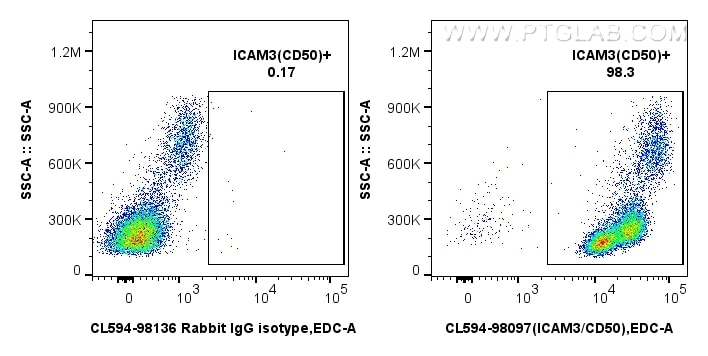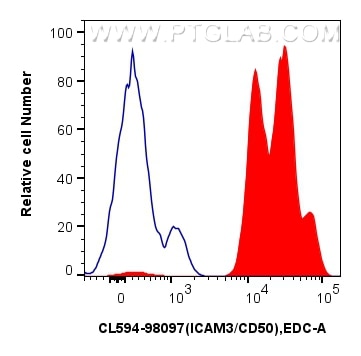Tested Applications
| Positive FC detected in | human PBMCs |
Recommended dilution
| Application | Dilution |
|---|---|
| Flow Cytometry (FC) | FC : 5 ul per 10^6 cells in 100 μl suspension |
| This reagent has been pre-titrated and tested for flow cytometric analysis. The suggested use of this reagent is 5 ul per 10^6 cells in a 100 µl suspension or 5 ul per 100 µl of whole blood. | |
| Sample-dependent, Check data in validation data gallery. | |
Product Information
CL594-98097 targets ICAM3/CD50 in FC applications and shows reactivity with human samples.
| Tested Reactivity | human |
| Host / Isotype | Rabbit / IgG |
| Class | Recombinant |
| Type | Antibody |
| Immunogen |
Recombinant Protein Predict reactive species |
| Full Name | intercellular adhesion molecule 3 |
| Calculated Molecular Weight | 547 aa, 60 kDa |
| GenBank Accession Number | BC058903 |
| Gene Symbol | ICAM3/CD50 |
| Gene ID (NCBI) | 3385 |
| Conjugate | CoraLite®594 Fluorescent Dye |
| Excitation/Emission Maxima Wavelengths | 588 nm / 604 nm |
| Form | Liquid |
| Purification Method | Protein A purification |
| UNIPROT ID | P32942 |
| Storage Buffer | PBS with 0.09% sodium azide and 0.5% BSA, pH 7.3. |
| Storage Conditions | Store at 2-8°C. Avoid exposure to light. Stable for one year after shipment. |
Background Information
The intercellular adhesion molecule (ICAM) family is a subfamily of immunoglobulin superfamily with five known ICAM family members (ICAM1 to ICAM5) which play a role in inflammation, immune responses, and intracellular signaling (PMID: 23287428; 29477378). ICAM3, also known as CD50, is a type I transmembrane glycoprotein that contains five C2-type immunoglobulin-like domains in its extracellular region, a single transmembrane segment, and a C-terminus cytoplasmic tail. ICAM3 is selectively expressed on leukocytes (PMID: 1730916; 8132828). It is the primary ligand for LFA-1 and is involved in various immune processes, including T-cell activation, and macrophage recognition of apoptotic cells (PMID: 11812993; 23775590).
Protocols
| Product Specific Protocols | |
|---|---|
| FC protocol for CL594 ICAM3/CD50 antibody CL594-98097 | Download protocol |
| Standard Protocols | |
|---|---|
| Click here to view our Standard Protocols |






